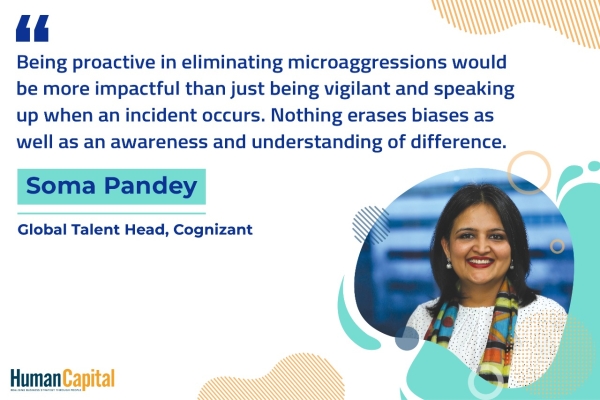Building a high-performance team is clearly not the easiest thing to do. While it is on every leaders’ wish list, not everyone around can create one. A high-performance team is one which delivers consistent result every single time, ensuring ‘customer delight’, not just satisfaction!
Every leader must question whether their team really is high-performing. If we seek an honest reply, many of us would realize that our teams do not fit the definition.
Creating high-performance teams is the result, but the question is, how does a leader create one? The input to this desired output is creating an ‘Eco-System’ that acts as an enabler in building high-performance teams.
Three Mantras for Creating High-Performance Teams:
Autonomy at work
This is the first step towards creating a high-performing team. Leaders must allow team members the freedom to express and approach tasks in ways that the individuals are most comfortable with, and works best for them. They must realize that each individual brings their own strengths, perspectives, and approach at work.
Leaders, on many occasions, get into micromanaging and even defining the approach as to how the activity or task must be carried out. If individuals are not allowed to express and approach things the way they wish to, this often leads to a ‘not so desirable output’. Besides, lack of autonomy at work also puts off many employees and becomes a primary concern for people to leave the company.
Here is what a leader should do -
• Co-create the purpose of why the team exists.
• Define the objective & scope of the project on hand.
• Define the expected result/outcome.
Once these three are defined, the leader should then leave it to individuals on how the task should be approached and completed.
While freedom is essential, leaders should also spend time reviewing/tapping upon the progress of the activity/task at mutually defined intervals.
Don’t be a Solution Provider
"As an individual contributor, you always look at solving problems on your own. As one moves up the ladder to become a ‘people leader’, many fail to transit mentally to a ‘leadership role’ and continue to be a solutions provider."
Many leaders think being a ‘solution provider’ is the primary job, and this is where they go wrong!
A key characteristic of high-performing teams is that every individual brings his/her own critical/analytical thinking to the table. These teams challenge the status quo and aren’t afraid to question the leader if they believe they have a better idea/solution to a given problem.
As a leader, one must question, does the above happen in my team? Leaders must focus on creating an eco-system that allows and, in some instances, forces people to think and find their own solutions. They must also understand that while they bring wisdom and experience to the table, team members should be encouraged to challenge their opinions and views. It has been observed that many leaders aren’t comfortable when their ideas and solutions are questioned, and this becomes an impediment in creating 'high-performing teams’.
Focus on Strengths & Address Fatal Weaknesses
India Inc. has always focused on addressing individual weakness, and we largely believe that this is the best way to help people improve and grow. However, multiple research studies have proved the above hypothesis to be incorrect.
"It is time for leaders to change their perspective and start focusing on ‘strength’ of an individual rather than a ‘weakness’. Moreover, focussing on ‘fatal weaknesses’ may hamper employee’s growth within the organisation."
The Individual Development Plan (IDP) conversations should predominantly focus on the following questions:
• What are your individual strengths?
• Are you really utilizing your ‘strengths’ to your optimum? If yes, can you cite a few examples and if no, why not?
• Are there any specific ‘fatal weaknesses’ we need to jointly address, which may stagnate or not allow you to grow further?
• What resources/training/coaching will you need to further capitalize on your ‘strengths’?
• What resources/training/coaching will you need to address your ‘fatal weaknesses’?
Leaders must ensure that every member of the team capitalizes his/her strengths to the optimum and addresses the ‘fatal weakness’. Besides, they must also ensure that individuals in a group complement each other with their strengths and help the team deliver consistently, resulting in customer delight!
.jpg)
Has COVID-19 forever changed the way we live and work?
Trending
-
SBI General Insurance Launches Digital Health Campaign
-
CredR Rolls Out 'Life Happens' Leave For Its Employees
-
Meesho Announces 30-Week Gender-Neutral Parental Leave Policy
-
Microsoft Unveils Tech Resilience Curriculum To Foster An Inclusive Future
-
60% Indian Professionals Looking For Job Change Due To COVID: Survey
-
SpringPeople And Siemens Collaborate For Digital Transformation Push
-
86% Professionals Believe Hybrid Work Is Essential For Work Life Balance: Report
-
Almost 1 In Every 3 People's Personal Life Affected Due To Work Stress
-
Meesho Rolls Out Reset And Recharge Policy For Employees
-
80% Of Talent Leaders & Academics Say Pandemic Changed Skill Needs For Youth: Report
-
Hero Electric Rolls Out 'Hero Care' Program For Employees
-
Human Capital In Collaboration With ASSOCHAM Hosts Virtual Conference
-
IKEA India, Tata STRIVE Collaborate To Create Employability And Entrepreneurship Opportunities
-
SAP India, Microsoft Launch Tech Skilling Program for Young Women
-
DXC Technology, NASSCOM Collaborate For Employability Skills Program
-
Lenskart To Hire Over 2000 Employees Across India By 2022
-
Mindtree Launches Learn-and-Earn Program
-
Tata AIA Extends 'Raksha Ka Teeka' To Its Employees
-
Swadesh Behera Is The New CPO Of Titan
-
NetConnect Global Plans To Recruit 5000 Tech Professionals In India
-
Hubhopper Plans To Hire 60% Of Indian Podcasters By 2022
-
Corporate India Needs More Women In Leadership Roles: Report
-
Aon to Invest $30 Million and Create 10,000 Apprenticeships by 2030
-
Tech Mahindra Launches ‘Gift a Career’ Initiative for Upskilling of Youth
-
40% Women Prefer Flexible Working Options in Post-COVID World: Survey
-
3 out of 4 companies believe they can effectively hire employees virtually: Report
-
Vodafone , CGI and NASSCOM Foundation launch digital skills platform
-
Odisha: Bank, postal employees to deliver cash for elderly, differently-abled persons
-
Skill India launches AI-based digital platform for "Skilled Workforce"
-
Hiring activity declines 6.73% in first quarter: Survey
-
70% startups impacted by COVID-19 pandemic
-
Bajaj Allianz Life ropes in Santanu Banerjee as CHRO
-
Over 70 Percent MSMEs look at cutting jobs to sustain businesses
-
93 Per Cent employees stressed about returning to office post-lockdown
-
Johnson & Johnson India announces family benefits for same gender partners
-
Indian firms turning friendly towards working mothers
-
Welspun India names Rajendra Mehta as new CHRO
-
Wipro partners with NASSCOM to launch Future Skills platform



Human Capital is niche media organisation for HR and Corporate. Our aim is to create an outstanding user experience for all our clients, readers, employers and employees through inspiring, industry-leading content pieces in the form of case studies, analysis, expert reports, authored articles and blogs. We cover topics such as talent acquisition, learning and development, diversity and inclusion, leadership, compensation, recruitment and many more.
Subscribe Now












































Comment